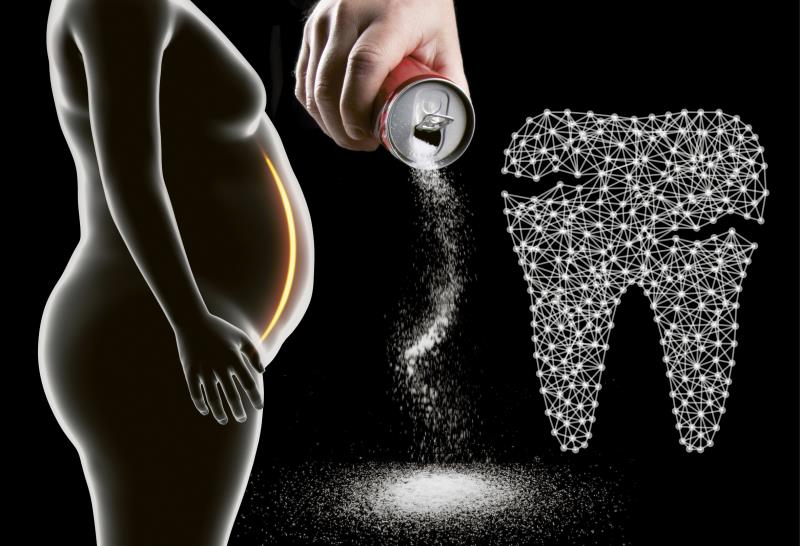
Obesity is positively associated with moderate-to-severe tooth wear among American adults, with the association partially accounted for by the consumption of sugar-sweetened acidic (SSA) drinks, according to a study.
“[T]he consumption of SSA [is] a common risk factor for both conditions,” said the researchers. “[T]he sugar content of soft drinks … [is] what leads to obesity, [while] the acidic nature of some beverages such as carbonated drinks and acidic fruit juices leads to tooth wear. As such, the key confounder here is the consumption of SSA.” [Lancet Diabetes Endocrinol 2016;4:174-186]
Data from 3,541 adults (52 percent female; 33 percent and 32 percent were overweight and obese, respectively) from the National Health and Nutrition Examination Survey were evaluated. Dietary recall data were used to measure average daily intake of four different drink categories: SSA, non-SSA, sugar-sweetened nonacidic drinks (SSNA), and non-SSNA*. [Clin Oral Investig 2019;doi:10.1007/s00784-019-03079-5]
After adjusting for confounders**, the number of surfaces with tooth wear among overweight and obese adults were 1.72 and 1.61 times higher, respectively, than adults with normal body mass index (p<0.05 for both).
Interestingly, there was a lack of association between BMI and the prevalence of tooth wear, noted the researchers. “[This] finding reinforces the opinion that a binary classification of individuals as simply having or not having tooth wear hides fine-grained information on the extent of the condition and may potentially mask associations.” [J Public Health Dent 2018;78:214-220]
Further adjustments for confounders and all types of beverage revealed a significant rate ratio (RR) among overweight (RR, 1.56; p<0.05) but not obese adults. This, according to the researchers, could be due to the possibility that obese adults may have already cut down their consumption of SSA drinks at the time of study, whereas overweight ones “might still be indulging”.
Adjusted models evaluating each beverage type revealed that the number of surfaces with tooth wear was 1.4 times higher among SSA drink consumers (p<0.05) compared with consumers of the other three types of drinks.
Non-SSNAs: Protective effect?
Of note was the inverse association between the consumption of non-SSNA drinks and number of surfaces with tooth wear (RR, 0.83; p<0.05), suggesting a potential protective effect. “This … could be due to the substitution of the acidic beverage with a less acidic counterpart or, less likely, due to the calcium and phosphate levels in the drinks encouraging remineralization or providing sacrificial minerals in the event of an acid challenge,” explained the researchers. [J Dent 2015;43:865-875; Eur Arch Paediatr Dentist 2014;15:413-419]
Substitution vs reduction
Given the role of SSA drink consumption in both obesity and tooth wear, reducing its consumption is an important target area for healthcare practitioners to consequently reduce its impact on both conditions, noted the researchers.
“Dentists must be aware of the health consequences of SSA drinks and advocate for reduction in consumption and/or substitution with healthier alternatives,” they said. It might be easier to advocate the latter using non-SSNA alternatives rather than an abrupt reduction, they added, citing evidence showing the relative success of substitution. [Sci Rep 2018;8:8024-8026]
The researchers suggested the inclusion of tooth wear assessment in national health surveys. Longitudinal studies using multiple dietary assessments, recurrent body measurements, and more accurate quantification of tooth wear progression may also be necessary to substantiate the associations between obesity, tooth wear, and the consumption of SSA drinks, they added.